
2021 Shattered Records Across the Board
In 2021, the world adapted to an ongoing pandemic. New variants kept the world on COVID alert. Industries shifted, rebounded and re-emerged; working styles adapted and consumers doubled down on their mobile-first habits: choosing to spend more time on their mobile phones than watching TV. In this new normal, the app economy continued to prosper.
In App Annie’s State of Mobile 2022 Report, we reveal another astonishing year for app developers, with revenue, downloads and time spent all soaring to new levels.
Direct App Store Spend: Consumers Splash $320,000 Every Minute
The app economy is huge, and it’s getting bigger. Indeed, in the time it takes to read this recap, mobile users will spend around $1 million on apps and games.
Overall, across 2021, app store consumer spend reached a new high of $170 billion (up 18% year on year). This outlay shows the extent to which consumers are prepared to pay for premium experiences and services inside their favorite products. Mobile has become the hub of managing our lives.
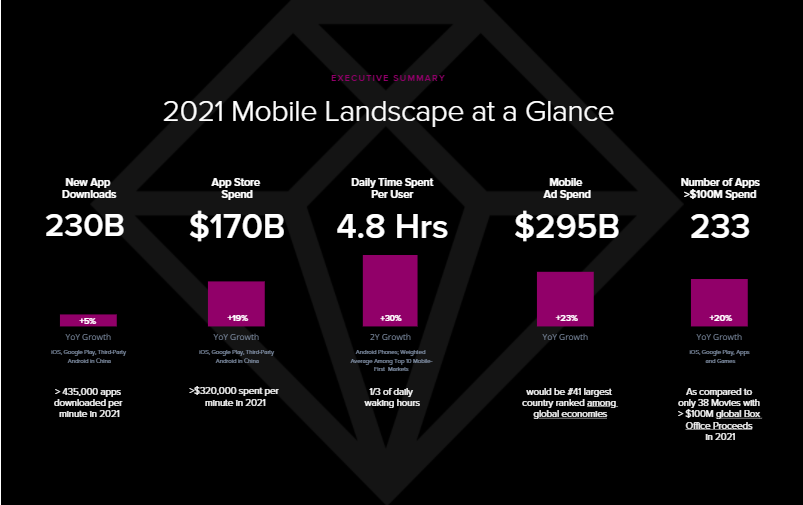
In 2021, as ever, gaming commanded the majority of direct consumer spend. Games generated $116 billion in the year – that’s 68 cents of every $1 spent in the app stores across iOS, Google Play and Third-Party Android Stores in China combined.
Game studios continued to innovate with monetization tools. Products such as Genshin Impact scored big with the ‘gacha’ model, in which players spend in-game currency to receive a random virtual item.
But other sectors also flourished. Consumer spending boomed inside live and content streaming apps such as YouTube, Disney+, TikTok and Twitch. Then there was the dating sector. Bumble joined Tinder in the Billion Dollar Club — an exclusive group also comprising just 16 apps including Tencent Video, LINE, BIGO LIVE, Google One and others.
Emerging Markets Dominate as Global Downloads Rose 5% to 230 Billion
Developed markets tend to be further along the mobile app market maturity curve as we enter 2022 — meaning they saw high growth in downloads approximately 5-7 years ago, and are seeing the bulk of growth occur in engagement and consumer spend. That being said, mature markets are still bringing in billions of downloads every year — the US for instance, heading into 2022 is third largest mobile market for downloads, despite its annual growth rate slowing.
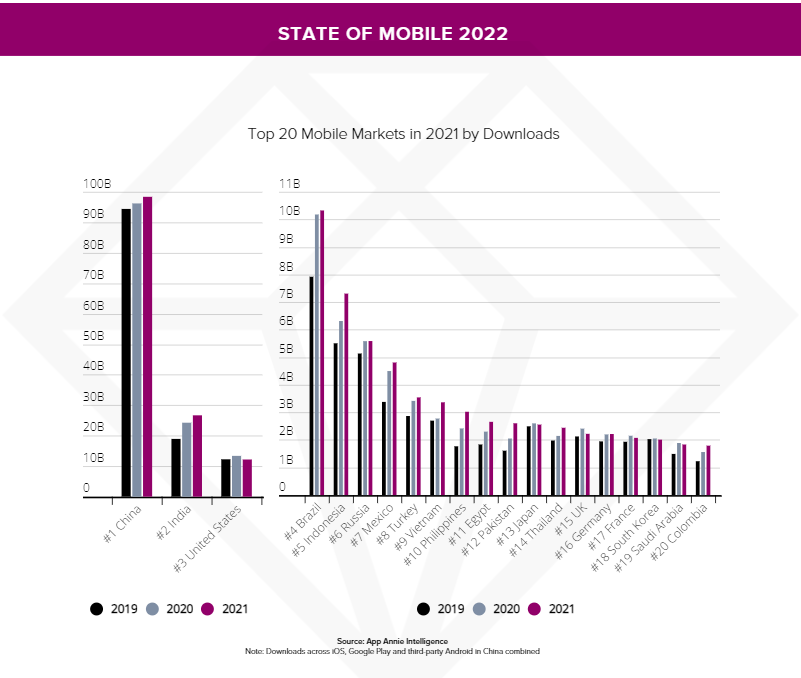
Yet it was a very different story across developing regions. Peru, Philippines, Vietnam and Indonesia were among the fastest growing markets for downloads at 25%, 25%, 20% and 15% growth YoY.
Apps At the Box Office: 233 Apps Grossed +$100 Million in 2021 Compared to Just 38 Movies
Last August, the critics raved at a smart and edgy re-make of the classic horror film Candyman. The movie did well, grossing $77 million at the box office. But in revenue terms it was outscored by at least 233 of the year’s top performing apps.
According to the State Of Mobile 2022, 233 apps pulled in $100 million or more in annual consumer spend, with 13 of them surpassing $1 Billion. This was up 20% from 2020, and around +35% from 2019.
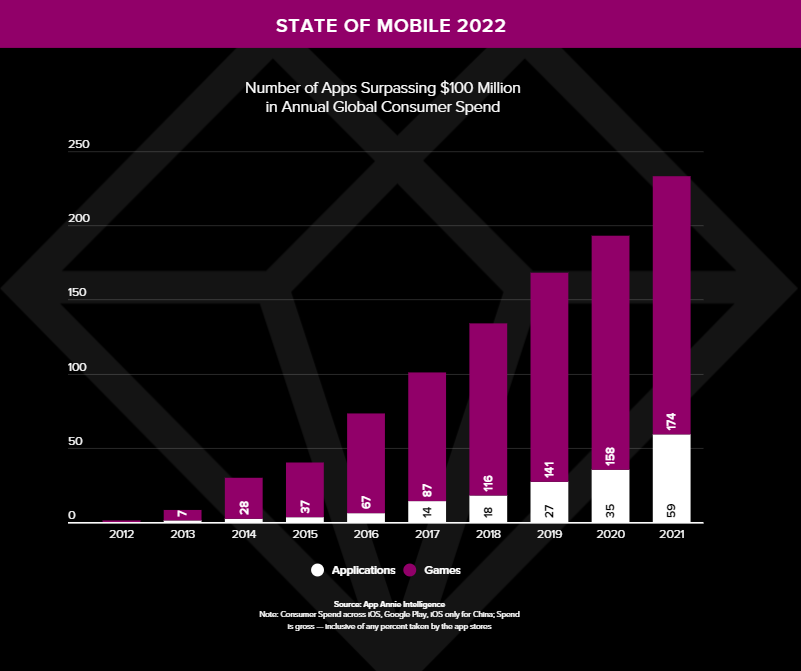
By comparison, just 38 movies achieved this milestone in global box office takings. The two totals dramatically reflect the long-term change in entertainment habits among consumers away from the big screen and towards handheld devices (though lockdowns and social distancing certainly accelerated it).
Improved connectivity, screen size and hardware have made it easier than ever before to enjoy premium applications and gaming experiences on-the-go.
And it’s not just games and entertainment apps that are grossing millions. Innovative app makers are continually developing products for which there is huge unrealised demand. Take the wellness space, for example. In August we reported that Calm had surpassed 100 million downloads worldwide to become the world’s most downloaded meditation app. In 2021, the app saw nearly $120 million in annual consumer spend — driven by demand for meditation apps and mental health support, magnified during the pandemic.
Mobile Ad Spend: the 41st Biggest ‘Country’ in the World
The mobile ad ecosystem enjoyed/endured an eventful 2021. It was the year that concerns over privacy finally turned into action. Apple ‘deprecated’ its IDFA, which meant most advertisers were no longer able to track and measure their users’ actions without an informed opt-in.
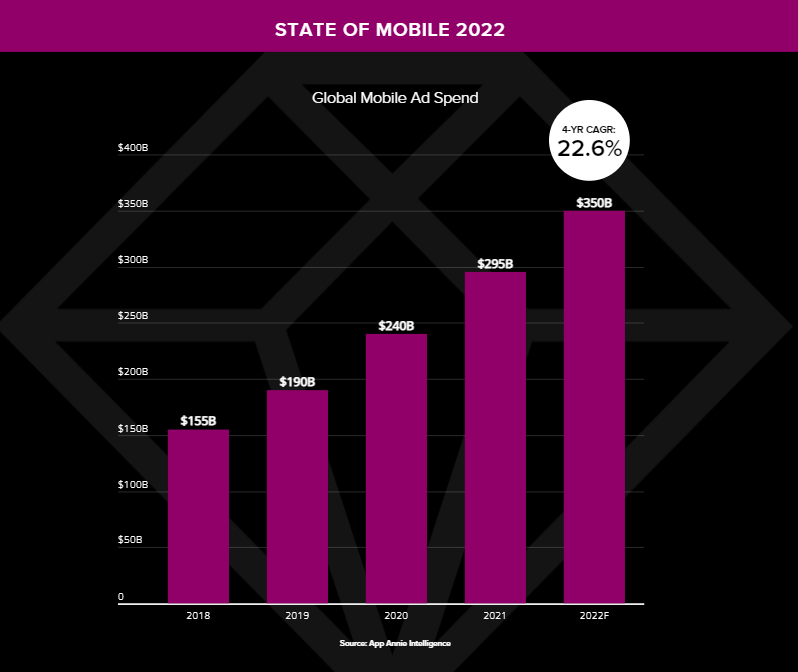
Nevertheless, for all the disruption, the spending continued unabated. In-app advertising still represents good value. Indeed, across 2021, total spend on app advertising reached $295 billion. That’s up 23% in a year. If the mobile ad economy were a country, it would be the 41st biggest in the world – between Bangladesh and Colombia.
Consumers in 12 markets Now Spend More than Four Hours a Day on Mobile
As the above stats for mobile advertising suggest, eyeballs across the world are switching to the small screen. In 2021, consumers in 12 countries spent on average more than four hours a day in apps (up from five countries in 2020). Meanwhile, users in Brazil, Indonesia and South Korea moved past more than 5 hours per day.
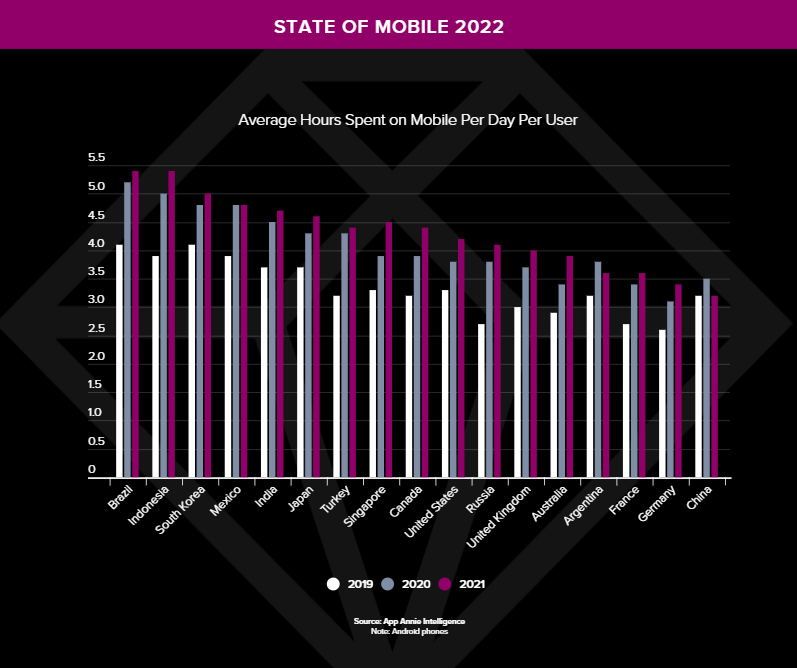
Staggering Rise of the Hypercasual Genre Fuels the Ongoing Rise of Mobile Gaming Adoption
Seven years ago consumer spend in mobile gaming overtook that of PCs and consoles. In the years since, the mobile sector has continued to grow – and there is no sign of a slowdown. Indeed, according to the State of Mobile 2022 report, mobile gaming grew by $15.5 billion in 2021 to bring total spend to surpass $116 billion.
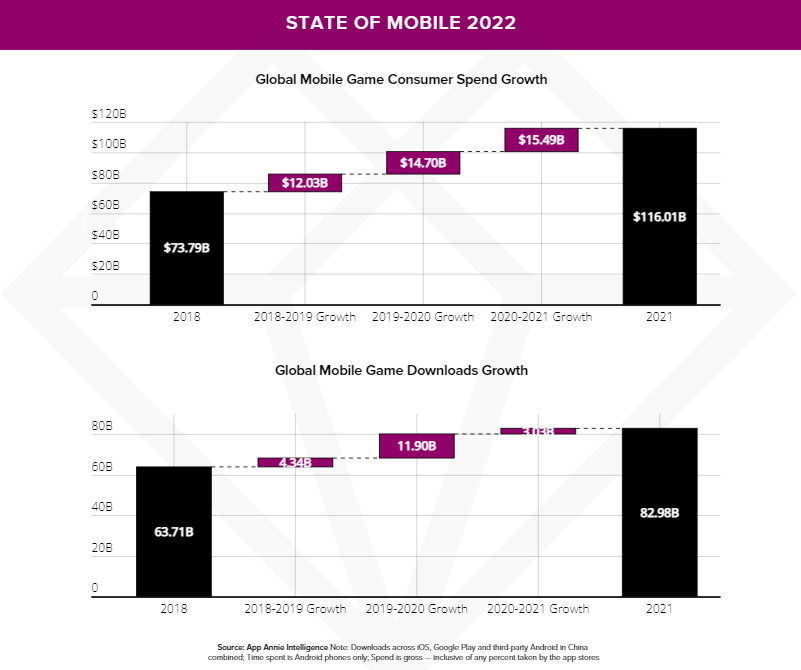
Downloads also trended upwards – up 3 billion in the year to 83 billion. And arguably the chief contributor to this was the huge demand for hypercasual titles. The category scarcely existed in 2017. But by last year, hypercasual games were the top gaming subgenres – contributing nearly 15 billion downloads – as games such as Bridge Race, Count Masters and High Heels dominated the charts.
Sector Highlights: Positive Headline Numbers Across Finance, Social, Shopping and More
To learn more about the data behind this article and what AppAnnie has to offer, visit www.appannie.com.







Sign up to receive our stories in your inbox.
Data is changing the speed of business. Investors, Corporations, and Governments are buying new, differentiated data to gain visibility make better decisions. Don't fall behind. Let us help.




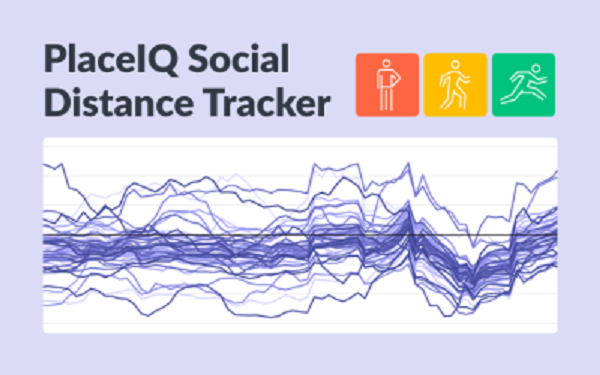
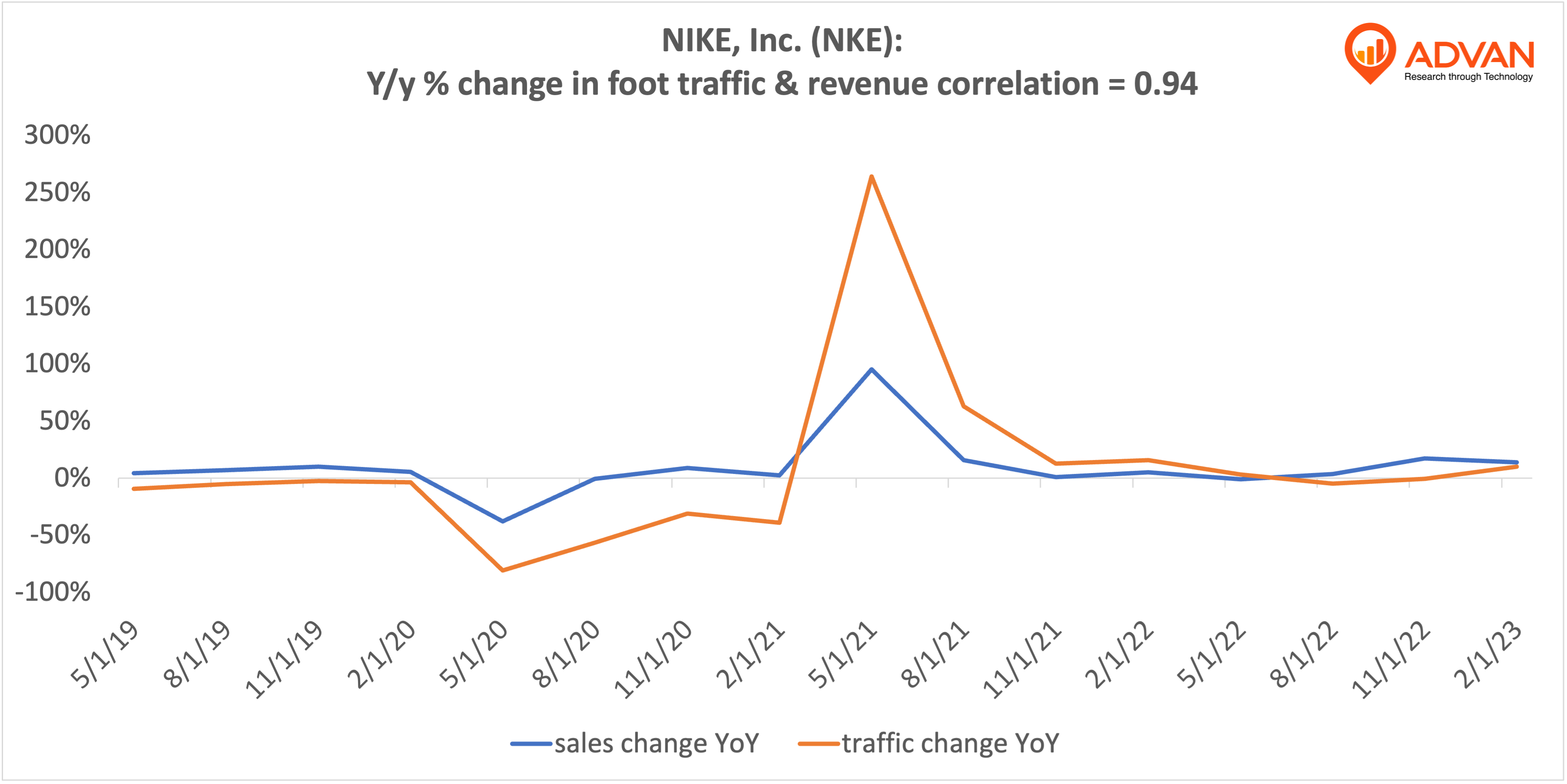







Sign up to receive our stories in your inbox.
Data is changing the speed of business. Investors, Corporations, and Governments are buying new, differentiated data to gain visibility make better decisions. Don't fall behind. Let us help.





